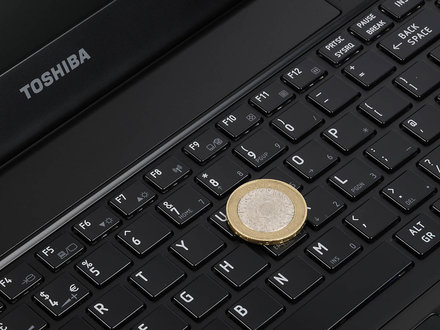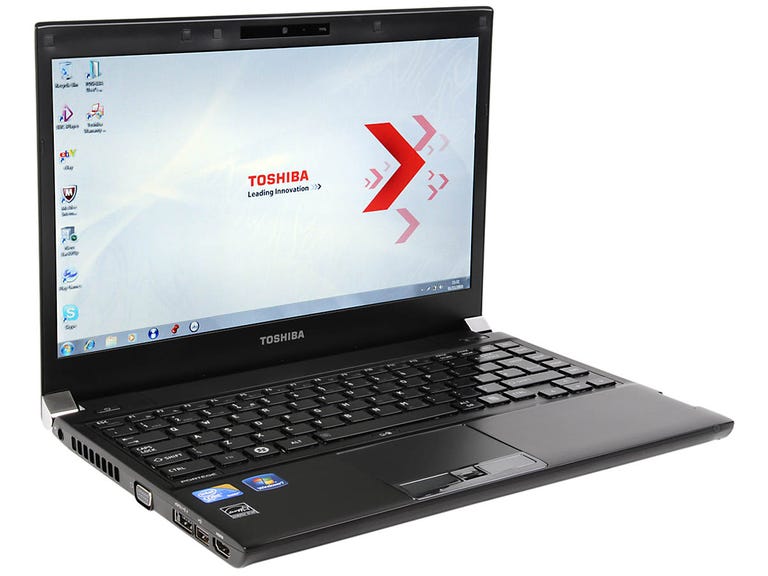 Why You Can Trust CNET
Why You Can Trust CNET Toshiba Portege R700 review: Toshiba Portege R700
The Toshiba Portege R700 is an impressively portable laptop, both in terms of size and weight. But we've seen cheaper machines that offer better displays and performance than our R700-160 configuration.
Portability is a technological virtue these days -- gadgets aren't much fun if you have to stay in one place to use them. That's why we all hate fax machines so much. The Toshiba Portege R700 is one laptop that takes portability to an extreme. Our fairly high-end configuration of this machine, the R700-160, costs around £1,100.
The Good
The Bad
The Bottom Line
Floaty light
When we grabbed the R700 in our sweaty hands, it nearly slipped out of our mitts and wafted out the window. This is one astonishingly light laptop. Despite rocking a 13.3-inch display, this machines weighs only 1.4kg. You could throw the R700 in a briefcase and forget all about it.
The R700 isn't just light, it's also impressively slender, measuring 316 by 26 by 227mm. Again, that makes it a perfect candidate if you're looking for a laptop that will slip into a bag alongside all the other detritus that abides there.
The laptop's build quality is good, although we noticed some flex in the keyboard. The materials out of which the laptop is made have clearly been chosen to make it as light as possible. We wouldn't fancy the R700's chances if it were dropped onto the pavement, but Toshiba has protected the hard drive against drops and sudden movement anyway, which might just save your bacon in a worst-case scenario.
We were impressed by the laptop's keyboard. It's large and well laid out. There's not much travel to each key, but we found typing at speed very comfortable. The trackpad isn't too small either. Navigating the 32-bit edition of Windows 7 Professional with this trackpad proved an efficient experience.
Around the sides, there's an impressive array of ports and extra gubbins, considering the slim dimensions of this machine. There are three USB ports (one is a combined USB/eSATA port); VGA and HDMI outputs; an Ethernet jack; 3.5mm sockets for headphones and a mic; a DVD rewritable drive; an ExpressCard slot; and a multi-format card reader. There's also a webcam above the screen, and a SIM-card slot beneath the removable battery, if you fancy indulging in some 3G connectivity.
Screen sadness
The R700 isn't perfect. Like many laptops designed to be taken on the road, its 13.3-inch, 1,366x768-pixel panel features an anti-glare coating to prevent annoying reflections screwing up your computing pleasure. We don't know whether it's because of this coating or some another reason, but the R700's display looks dull and slightly yellowish.

There's some flex to the R700's keyboard, but it's easy to type quickly on.
If you only need to read text and blast through emails, a dull display might not bother you much. But, if you were hoping to throw some pretty pictures or movies at this bad boy, think twice.
Graphics gap
The R700-160 sports a dual-core Intel Core i5-520M CPU clocked at 2.4GHz, backed up by 4GB of RAM. Since the laptop only runs the 32-bit version of Windows 7, however, it can only actually draw on 2.86GB of that memory. The processor is pretty powerful, though. When we ran the PCMark05 benchmark test, the R700-160 scored 5,857, which is very respectable.
With a score like that, this laptop will be able to handle just about any multi-tasking chores you choose to throw at it, and it certainly seemed very nippy in our testing. But there's no dedicated graphics card on-board, so the R700-160's multimedia abilities are hamstrung. When we ran our 3DMark06 benchmark test, the laptop managed a score of only 1,944, which is pretty weedy.
This is a laptop that's primarily aimed at the business market, and that audience may not care so much about playing games or watching movies, but its lack of graphical prowess makes the R700-160's price seem rather steep. That's especially true when you call to mind laptops like the 15.6-inch Samsung P580, another business-focused machine that offers excellent performance and is several hundred pounds cheaper.
The R700-160's battery life is pretty average. When we ran the Battery Eater Classic test, which runs the CPU at 100 per cent until the battery dies, the R700-160 endured for 1 hour and 42 minutes. That's not exactly mind-blowing, but it's reasonable, especially for such a slim and light machine. You'll get much better battery performance with more moderate use.
Conclusion
There's not a great deal wrong with the Toshiba Portege R700-160. It really is impressively slim and light, and it packs some decent processing grunt. But its high price, dull display and lack of a dedicated graphics card let it down.
If you prize portability above all else and you can afford it, the R700-160 will prove a decent little laptop. Otherwise, we'd recommend checking out the Samsung P580, which is cheaper and offers superior performance.
Edited by Charles Kloet


